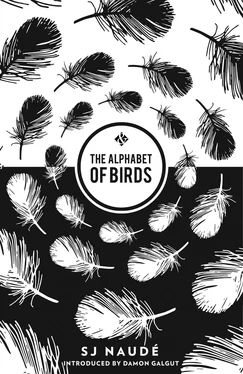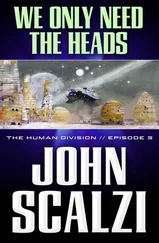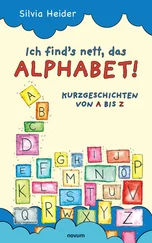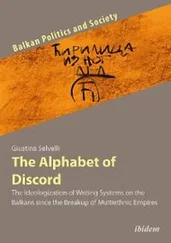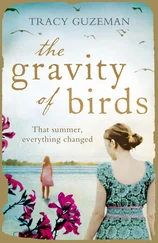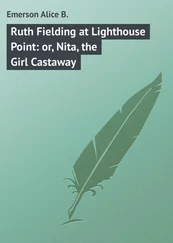The restaurant is in a shopping centre, right at the edge of the city, on an otherwise empty plain. Cars are gleaming in the sun on a tarred carpark surrounded by fields of grass and pylons.
They are sitting in the cool restaurant against the back wall. Tiles on the floor, stainless-steel tables. Bright light. Sam is wearing a downy white jersey (angora? mohair?). It forms a kind of halo around him so that his body has no clear boundaries but frays at the edges. Behind Sam, there is surprising wallpaper. A paradisiacal landscape. In soft shades of yellow, orange and rusty brown, here and there some sky-blue mist. Everything flooded with celestial light emanating from an indeterminate source. As if the landscape is glowing from inside. Snowy peaks, cliffs, dizzying waterfalls.
The waiter takes their order. He keeps looking at the wallpaper behind Sam: knotty trees growing from crevasses in the steep cliffs, hanging gardens, ferns disappearing into the spray, birds like bright flakes against the rushing water. On a rocky outcrop above the waterfall: an angel on his toes, wings stretched wide.
He is feeling clear, filled with insights and the urgency to sharpen these insights.
He focuses on Sam, forgets the landscape for a moment.
‘So, where is all this heading?’ It sounds blunt, the question, when he hears himself asking it.
Sam stiffens, acts as if nothing has been said. It seems as if the landscape behind him darkens. Is there a tiny figure hanging above the watery turbulence? He focuses on it. The figure is actually moving, yes, swaying ever so slightly. He now also notices a ruin on the soft green grass above the abyss, bathed in the omnipresent light.
The food arrives, but they instantly forget about it. Behind Sam, the water keeps falling and falling. Sam pours a glass of mineral water, then slowly empties it without putting it down.
He repeats the question. Their knives and forks remain on the table. Blindingly clean.
‘I don’t know,’ Sam says. ‘Nowhere?’
He looks out of the restaurant window. Some distance away, in the haze, the profile of the Voortrekker monument is vaguely discernible.
He opens his mouth once or twice, closing it without saying anything. Then: ‘Nowhere? Over? Just like that, without warning? As suddenly as it started?’
Sam smiles, teeth as white as snow. ‘No, that’s not what I meant. Not over. Nowhere, everywhere. All the same. Everything is what it is, no? Or what it is becoming. Why must things have a fixed shape? You should prise the shapes open.’
Sam’s wrist makes a shadow movement, as if he is practising a piece of choreography.
He gets up. ‘That’s not enough.’ He wants to add: I need proper beginnings and endings, structure. ‘I’m going now.’
He leaves two R100 notes on the table for the untouched food, gets up and walks out without looking at Sam or the waterfall. Only when he gets outside does he realise that there is no way for him to get back to the city. Had it not been for the mushroom juice in his blood, he might have stopped himself, but now he starts walking on the hard shoulder, along the busy road. He is ready for the long trek. In the distance, he can see the outlines of the Voortrekker monument. He is walking towards it. He takes off his shoes so as to feel the tar under his feet. The further he goes — cars speeding past, the engine heat against his skin — the looser he becomes.
He takes his shirt off too. He is sweating. The silver helmet appears next to him, and the Vespa. Sam is driving along slowly, has to put his foot down every now and then to balance himself.
‘Your feet,’ Sam says, ‘they’re bleeding.’
He looks at Sam and then down at his feet. ‘I find it beautiful,’ he says, ‘the blood.’
He keeps walking. Sam stops on by the side of the road, kicks out the scooter’s stand. Sam walks after him, takes him by the shoulder, holding out the helmet.
‘Come on,’ Sam says, ‘don’t sulk.’
Behind Sam cars are speeding like spaceships in orbit. He stops, but does not take the helmet from him. Sam takes off his own helmet. His hair is strewn out like a black sun.
‘We can talk about it if you want.’
Sam embraces him tightly, silently, a helmet dangling in each hand. Just as swiftly, he disengages himself again. Sam puts the helmet on for him, tying the buckle under his chin in a fatherly manner. A few long strands of hair still cling to the inside of the helmet. Sam tests whether it fits snugly, then knocks on it three times with his knuckle.
‘It is not enough,’ he says to Sam and shakes his head, ‘to look at you when you’re dancing. Not enough to ride around with our bodies pressed against each other. We are on a false track. I need more. Substance, direction. I don’t want to hear some sort of cliché like “the only constant is movement”. Or nonsense about amorphous shapes—’
Sam puts a finger to his lips, silencing him.
‘On second thoughts,’ says Sam. ‘Let’s not talk. You should learn to do without words. There are better things.’
They walk back to the scooter. He gets on the back and they go: his arms around Sam, his helmet knocking against Sam’s. Like when they met for the first time. Would this, after all, have to do: endless journeys on the back of a silver rocket, wind and movement and looseness? Far-off sightings of Sam on a stage? Milling about in idyllic or overgrown gardens? He empties his mind. Sam’s hair is blowing against his cheeks. Neither says anything. It is just them and the cars and the warm wind. The smell of melting tar.
Sam turns his head, says something that gets blown away.
‘What?’
‘I want to show you something.’
They drive into the city centre. He tightens his arms around Sam. He has not been here for years. It looks pretty gloomy. They drive past a church. In his childhood, he recalls, he sang in a school-choir competition here. A Dutch Reformed church it was back then: a piece of architectural brutalism, the overwhelming weight of concrete miraculously suspended at precarious angles. Small shards of coloured glass in the concrete. Now it has a high fence. A sign above the entrance indicates that it is a haven for street children and refugees.
They stop in one of the shoddiest streets in the city centre. A paper bag blows down the street. Weightless and pale, half-translucent. The street is empty, the cars’ windows blind in the afternoon sun. He wonders who is sitting in the cars, watching them. He hears a hyena laughing, or perhaps a wild dog. (He no longer knows the animals.)
On the pavement someone is waiting for them. Sam must have contacted him earlier. The man is standing in front of a seventies office building, in shades of blue and grey, with lots of broken panes. Sam introduces him to the man. Somewhere behind them, the barking sounds again.
He looks queryingly at Sam and the friend. The latter cocks his head too, listens for a moment.
‘The zoo,’ he says. ‘Just a block away. Hyenas.’
There is nothing where the front door used to be. They enter. The lift shaft is empty. Just a piece of cardboard up to hip-height instead of a lift door. They walk up the stairs. People are living here. Dishwater (or perhaps sewage) is trickling down the stairs. When you peer through open doors, there are children’s faces in the dim light. Buckets and food smells. The smoke of a coal fire. Half-naked bodies, West-African French on radios. On the top floor they encounter the only door, made of steel. Sam’s friend unlocks it with difficulty.
‘Come and have a look at his exhibition,’ Sam says.
A kind of improvised art gallery. The internal walls have been removed across the entire floor to form a long, low space interspersed with pillars. There is a small group of people in the opposite corner. The carpets have been ripped out. Carpet glue still clings to the concrete floor and sticks to your soles. There are photos hanging on the walls. Suburb is the title of the exhibition. The photos are big, two by three metres each. There are three series: ‘Ghost Pools’ is the first. A photo of a carpark in front of a suburban house which now houses a swimming-pool business. If you look carefully, you can see the outlines in the concrete of a former swimming pool. Another photo is of an empty municipal swimming pool in which concrete is growing through the cracks. Another one of a children’s pool in a small park. Leaves float on the surface. A woman is standing in the water, bent over, washing foaming laundry. Her dress is tucked into her underwear. ‘Burn, baby, burn’ is the title of the second series. Photos of burnt-out suburban homes. Then comes ‘Gardens of Eden’. Urban gardens: wintry gardens snapped through barbed wire, forgotten little rock gardens in public parks, lilies on a traffic island, a shattered greenhouse on a plot which is now a taxi rank — a single orchid surviving amidst shards of glass. Ever smaller, the gardens.
Читать дальше
